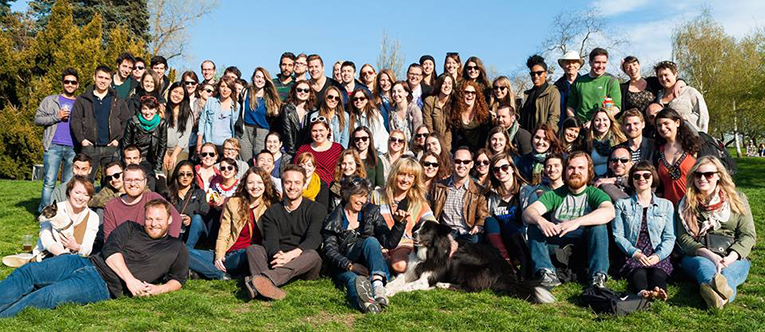To get TEFL certified abroad or at home? That is the question. In fact, I’ve been asked this question hundreds of times over the past decade from prospective teachers interested in getting TEFL certified. I normally explain with a few short reasons, for the sake of brevity, but there are so many valid reasons that I’d like to take the time to explore in depth.
Where you start your TEFL journey will often determine where you end up, so the choice to take your TEFL certification at home or abroad is actually the most important choice you’ll make as a new teacher.

Prague
I’ve been a teacher trainer for over 10 years in Prague; I have personally trained over 2000 new teachers, who went on to work successfully all over the world. So trust me, you can take my word for it. From my extensive experience, the answer is easy: get your TEFL certification on-site abroad. If you’re serious about doing this whole TEFL thing, do yourself a favor and read on:
1. Cost Effectiveness
For the most part, taking your training abroad is going to save you money on your TEFL certification courses overall. If you’re from the UK, Canada, or the U.S., TEFL programs at home are simply going to cost A LOT more for the exact same amount of training you can get in a city like Prague. Even taking into account the cost of a plane ticket and housing for the duration of your TEFL program abroad, courses back home will usually still be more expensive.
2. Job Assistance
Most TEFL certification programs abroad take on the responsibility of getting newly certified teachers real ESL teaching jobs, because they literally need to in order to make the next batch of students more ept to join and positive about their job prospects upon graduation. If newly TEFL certified teachers didn’t get teaching jobs, there would just be a bunch of jobless TEFL program graduates roaming around their host city like lost puppies. Therefore, in general, international TEFL certification programs include excellent job assistance services for all graduates. This includes CV workshops, demo lesson work, language school open houses, job boards, and more.
On-site TEFL programs also tend to have direct relationships with language schools located in the same region, detailed knowledge of hiring practices, tips and tricks specific to the culture, and tons of graduates already working in the area who can help recommend new alumni!
On the other hand, TEFL training centers in your home country won’t likely have personal relationships with language schools and employers abroad, because they literally are not located in the same place, which would allow them to develop a relationship. Even if they have some contacts abroad, it’s likely that they have never actually met these employers, so they won’t be able to vet them for legitimacy or quality. TEFL certification programs in your home country also won’t have the pressure of time forcing them to help their graduates find work, so job assistance won’t be as high of a priority.
The majority of TEFL certification programs in your home country are not going to offer the same amount of job assistance that a TEFL program abroad can, nor would they even be able to if they tried.

Castle costume party for TEFL students in Prague
3. Job Opportunities
Aside from built-in job assistance, the chances of finding an English teaching job if you’re already in the country or region you wish to work are much higher than if you’re applying from way back home.
Think about it, who would you rather hire: the teacher who is interviewing right in front of you or the teacher who’s applying from thousands of miles away? The answer is pretty simple.
Not only do language schools like to meet you in person to get an idea of your teaching skills, they also can never be sure that a foreign teacher will actually make the move to their country even with a job offer in hand. It’s a needless risk for the school, if they are given the chance to hire someone in person instead.
If you can interview face-to-face, the chances of getting hired for a TEFL job abroad are extraordinarily greater than interviewing from home.
4. Realistic Practice Teaching
Most of your actual teacher skill development will be gained through in-course practice teaching hours. While home-based courses may still be able to help you find students who are learning English to practice your new skills with, it is simply not the same as teaching ESL students in another country. This is because students in your home country will be at least somewhat familiar with your culture; they may watch the same TV shows, read the same newspapers, know about local politicians, shop at the same supermarkets, etc. Although they are not a native English speaker, they are still living in an English-speaking environment so English surrounds them at all times.
Teaching English to students in a foreign country (in an environment that is foreign to you) is a completely different ball game. Not only will you learn how to communicate with new English language learners, you’ll also learn how to break down cultural barriers that inevitably exist when teaching individuals who come from a completely different cultural background than you. The experience of teaching real students abroad really cannot be replicated by teaching ESL students in your hometown or a city you’ve been living in for an extended period, even if they are learning English for the first time.
It’s clear which kind of practice teaching experience truly prepares you for teaching English as a foreign language to real students abroad, the REAL thing.

TEFL trainees socializing after class
5. Visa Coordination
If you want to teach English in Europe and you don’t have an EU passport, you’ll need a visa. Many language schools abroad, even those who hire foreign teachers frequently, will NOT handle this process for you; instead, it’ll be up to you to get the appropriate visa needed to teach abroad legally in your country of choice. The good news is: the majority of TEFL certification programs abroad understands how difficult it can be to apply for visas to countries you’ve never stepped foot in, so they will provide you with all the resources needed to legally get yourself set up abroad, including visa advice.
A TEFL program in your home country won’t know what it takes to get you a visa so you can legally work in any country on Earth. But, if you earn your TEFL certification in the country where you wish to teach in the future, getting the visa assistance you need to teach abroad legally will be a piece of cake!
6. Making Friends & Networking
There are few bonds stronger than the ones you make while traveling, and sharing an intense, new experience. These types of bonds cannot be so easily fostered in the comfort of your own home, or home country. Trainees who complete TEFL courses abroad together, therefore, often become friends for life, so look for a TEFL school or program provider that goes out of their way to cultivate a supportive community. From the first week of your program, you will benefit from meeting alumni, forming friendships, and making connections, whether for jobs, flats, or fun activities.
Community building and networking opportunities really are an important part of the whole TEFL certification experience, especially because having a group of supportive friends and contacts abroad will be critical to your success in a new country and career.

7. Cultural Adjustment
What is it like to live abroad? Are you going to be able to handle the pressure of moving to a foreign country? Taking your TEFL courses abroad will help you answer these questions, without a doubt. Most on-site TEFL programs even have specific course components set up to help you adjust to life in a new country, afterall you are customers, so they will want you to have a good experience and feel comfortable. In addition to job and visa assistance, cultural orientation and local assistance will go as far as helping you with medical issues if they come up, getting you comfortable navigating your new home, teaching you the local language, providing you with ways to become part of the local community, and the list goes on and on.
8. Accommodation Help
Where are you going to live abroad? How are you going to set this up? Finding accommodation abroad can be tricky. Being “on the ground” will save you a great deal of time, money, and stress when trying to find a place to live, and take the worry out of committing to a place to live that you haven’t been able to see in person. Additionally, there are some legitimate scams out there that prey on foreigners looking for accommodation abroad that you’ll have to watch out for.
If you’re already in your desired host country for your TEFL training, you’ll probably have student housing of some sort throughout your courses, giving you ample time to search for a flat in person. Not to mention, many on-site TEFL certification programs will provide you with assistance in hunting for an apartment or other place to live. Again, local connections will make a big difference.
9. You’re Already There
You’ve already made the commitment and moved abroad. You’ve already completed TEFL training and earned TEFL certification. You’ve gotten legal, found an apartment, gotten settled, and made friends. Therefore, most of the work required to successfully teach English abroad is already done! The only thing left for you to do with be to go to interviews and get hired as an English teacher.
Compare that with where you’ll be if you earn your TEFL certification at home. You’ll have so much more to do after you complete your TEFL courses that it may seem like your training is hardly finished. In reality, you will have scratched the surface, because you won’t have even started the process of moving abroad, AND you’ll be doing the majority of that process all on your own.
Taking your TEFL courses abroad makes the whole process of teaching English abroad easier, because most of the stressful legwork will already be taken care of during your TEFL training.

Community of TEFL students in Prague
10. The Reality
Now, let’s take a look at a real-life scenario.
Let’s say you have two Americans and both want to teach in Europe. One, let’s call him Jim, decides to take a course at home. Another, Jessica, decides to take TEFL courses abroad in Europe.
Jessica arrives, is picked up by her TEFL program provider at the airport, and driven to her temporary accommodation that’s ready and waiting for her. The TEFL program provider has already told her what documents she needs to have for a visa, so she has all of that paperwork already organized. Right after arriving, she meets a dozen other brand new teachers on her course and begins to develop friendships with them.
The TEFL course provider arranges a great orientation program, so now she knows how to navigate public transportation, has a bank account, has a cell phone, and understands the ins and outs of her new home. Since she knows all of these new people, she immediately has a social network and support group. Furthermore, the staff at the program made the same move abroad and can offer personal experience and help about living in the new country. During the course, Jessica decides to room with some friends from the program and they are able to secure her long-term housing.
By the end of the month, she feels well trained in teaching and well versed in the culture of her new country. The TEFL program provider helps her rewrite her CV to be appropriate for the region, and arranges for representatives from local language schools to visit her. She then applies to work with several schools. These language schools already have experience with past graduates of her TEFL program provider and hire her to start work right after she finishes her TEFL certification.
Jim, on the other hand, graduates with his TEFL certification in the U.S. He feels confident in his teaching, but now what? The TEFL course provider gives him a list of schools in the country he wants to teach English abroad in. He contacts them, but they don’t respond back; they are too busy hiring Jessica, and her other friends who were able to interview in person.
After a while he does find a large school that is willing to hire him without meeting him in person. The problem is that he doesn’t have a place to live, doesn’t know anyone, and is confused by the visa process. On top of this, he now has to buy a ticket and move abroad alone. Daunted by all of these extra factors, he decides that it’s simply not worth the risk and doesn’t make the move. He starts to wonder if paying for the TEFL program at home was a mistake.
While these scenarios don’t apply to everyone, this is the reality for many TEFL-certified graduates who choose to obtain TEFL training at home.
So, if you really want to earn a TEFL certificate and succeed, take the plunge and complete your TEFL training abroad through a reputable company.
Before selecting a school, weigh the pros and cons, check out what is included and make sure it offers the kind of assistance outlined above; it’ll make a huge difference in your experience of teaching English abroad!
This article was contributed by The Language House TEFL, which provides TEFL training courses, and everything listed above and more, all in the beautiful city of Prague.







